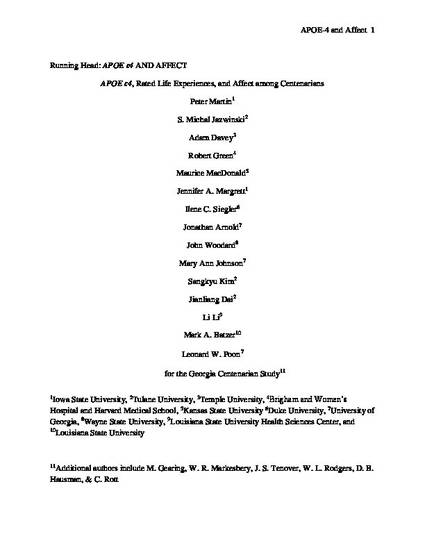
Objectives: The purpose of this study was to assess the relationship between apolipoprotein E (APOE), life events and engagement, and subjective well-being (as measured by positive and negative affect) among centenarians. Based on the life stress paradigm, we predicted that higher levels of stress would allow APOE to influence positive and negative affect.
Method: 196 centenarians and near-centenarians (98 years and older) of the Georgia Centenarian Study participated in this research. The APOE, positive and negative affect, the number of recent (last 2 years) and lifelong (more than 20 years prior to testing) events, as well as a number of life engagement tasks were assessed.
Results: Results suggested that centenarians carrying the APOE ϵ4 allele rated lower in positive affect, the number of lifelong events, and in engaged lifestyle, when compared to centenarians without the APOE ϵ4allele (t = 3.43, p < .01; t = 3.19, p < .01; and t = 2.33, p < .05, respectively). Blockwise multiple regressions indicated that the APOE ϵ4 predicted positive but not negative affect after controlling for demographics. Gene–environment interactions were obtained for the APOE ϵ4 and lifelong events, suggesting that carriers of the APOE ϵ4 allele had higher scores of negative affect after having experienced more events, whereas noncarriers had reduced negative affect levels after having experienced more events.
Conclusion: APOE ϵ4 is directly related to positive affect and is related to negative affect in interaction with life events.
Available at: http://works.bepress.com/peter-martin/29/

This is an accepted manuscript of an article published as Martin, Peter, S. Michal Jazwinski, Adam Davey, Robert C. Green, Maurice MacDonald, Jennifer A. Margrett, Ilene C. Siegler et al. "APOE ϵ 4, rated life experiences, and affect among centenarians." Aging & mental health 18, no. 2 (2014): 240-247. doi: 10.1080/13607863.2013.827624. Posted with permission.